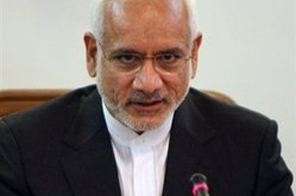Iran atomic chief Aghazadeh resigns
TEHRAN: Gholam Reza Aghazadeh, Iran's atomic chief who has spearheaded the Islamic republic's controversial nuclear programme for more than a decade, has resigned, the ISNA news agency said Thursday.
It said that Aghazadeh had also quit as the country's vice president, adding that he submitted his resignation letter to President Mahmoud Ahmadinejad almost three weeks ago which was accepted.
The report gave no reasons for the resignation, which comes a day after US Secretary of State Hillary Clinton renewed a limited US offer to hold a dialogue with Tehran over the nuclear stand-off.
The atomic chief's resignation comes ahead of sweeping changes expected in Ahmadinejad's next government which will be unveiled next month.
The hardline president vowed last month to change the structure of the new government by making "considerable changes" to his cabinet.
Aghazadeh is a veteran official of the Islamic republic and was executive deputy to Mir Hossein Mousavi during his premiership in the 1980s.
Mousavi, Ahmadinejad's closest rival in presidential elections last month but who lost heavily to the incumbent, has charged that the vote was rigged.
His challenge of the official results sparked massive anti-Ahmadinejad protests which saw hundreds of thousands of demonstrators take to the streets of Tehran and other cities.
Aghazadeh was also oil minister from 1985 to 1997 after which he was appointed chief of the atomic organisation under reformist president Mohammad Khatami.
He continued to serve in the same capacity under Ahmadinejad and has been deeply involved in Iran's nuclear programme.
Global powers led by Washington suspect Tehran's nuclear drive is aimed at making atomic weapons, a charge strongly denied by the Islamic republic and on several occasions by Aghazadeh himself.
Aghazadeh has supervised the nuclear programme which Iran says has developed technology able to master the complete nuclear fuel cycle.
At the heart of Iran's nuclear controversy lies its defiant continuation of enriching uranium. Highly enriched uranium can be used to make atomic weapons while low enriched uranium is used in nuclear power plants.
Clinton on Wednesday renewed a US offer to engage Iran in talks aimed at resolving the nuclear crisis.
She repeated previous calls to "lead with diplomacy, even in the cases of adversaries or nations with whom we disagree."
Since assuming office in January, US President Barack Obama has taken steps towards engaging Iran diplomatically, departing from the policies of former president George W. Bush who refused direct negotiations with Iran and spearheaded pressure for economic sanctions against the Islamic republic.
Clinton said that neither she nor Obama held "any illusions" that direct talks with Iran "will guarantee success."
At last week's summit of the Group of Eight leaders, Obama warned that the world will not wait "indefinitely" for a response to its offer of dialogue with Iran on the nuclear issue.
He said leaders would re-evaluate the "Iranian position" in September.
The G8 joint declaration expressed "serious concern" over post-election violence in Iran but called for a negotiated resolution to the standoff over Tehran's nuclear programme, giving it until September's G20 summit.
A meeting of G20 leaders is due to be held at Pittsburgh, Pennsylvania, on September 24-25.
On July 11, Iranian Foreign Minister Manouchehr Mottaki said Iran is preparing a package for the international community aimed at resolving all regional and global disputes.


